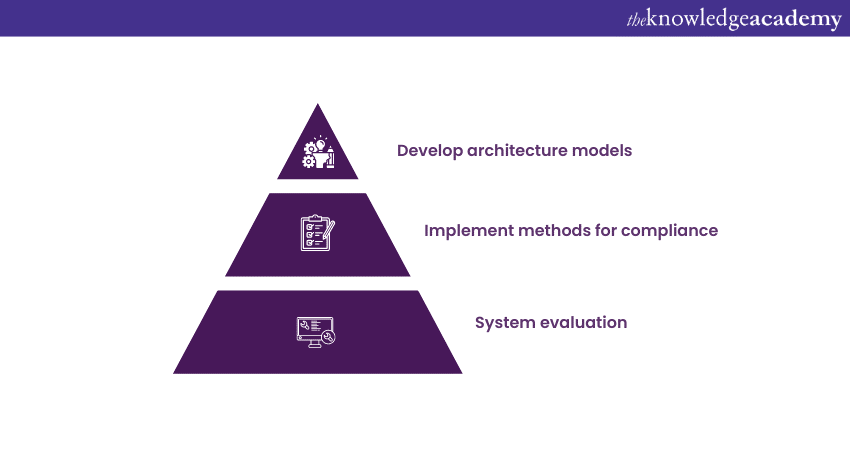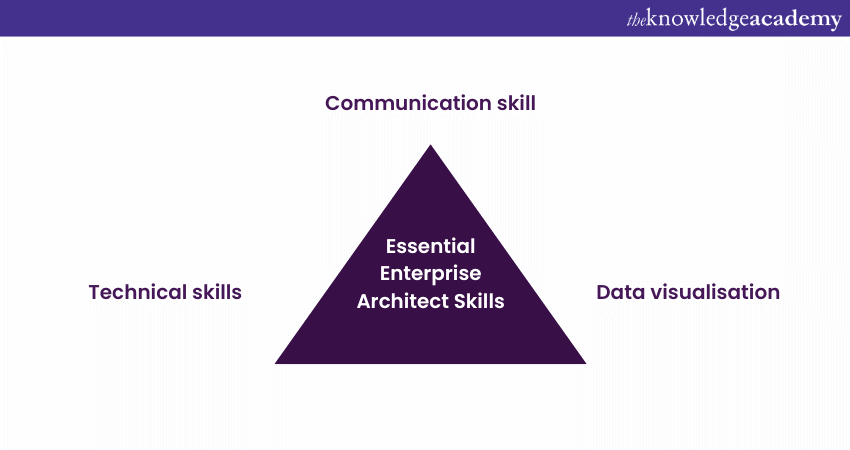We may not have the course you’re looking for. If you enquire or give us a call on 01344203999 and speak to our training experts, we may still be able to help with your training requirements.
We ensure quality, budget-alignment, and timely delivery by our expert instructors.

Understanding the technical infrastructure needed to support a business by defining its strategic direction is known as Enterprise Architecture. Determining the outdated systems, hardware or software that need to be updated and which services or products of the company support each department's business processes demands complicated thinking and planning form an essential aspect of this job. However, you might wonder How to Become an Enterprise Architect.
In recent years, their role has become critical in bringing about digital transformation in the workplace. Read this blog to learn How to Become an Enterprise Architect, the essential skills, and understand what they do.
Table of Contents
1) Who is an Enterprise Architect?
2) What does an Enterprise Architect do?
3) How to Become an Enterprise Architect?
4) Essential Enterprise Architect skills
5) Types of Enterprise Architect careers
6) Reasons to become an Enterprise Architect
7) Conclusion
Who is an Enterprise Architect?
Enterprise Architects are responsible for designing and executing enterprise-wide systems. They also engage with Project Managers to ensure that the system is being developed on time and within the budget provided.
To address and resolve opportunities and issues connected to business, information, and technology, they combine many various talents and expertise. The "glue" that unites project and project strategies across numerous projects, ensuring alignment with company strategy, drivers, and management priorities, is often the Enterprise Architecture created by the Enterprise Architects.
By working throughout the organisation, they understand the requirements of various business units and processes. This position demands good communication and analytical abilities to guarantee that the business unit has the necessary resources for success.
They need to have a good understanding of business and information technology to ensure that the system they are building meets the needs of both businesses and the technical teams. Strong leadership skills also characterise them as they work with a group of people with diverse expertise.
They also require strong communication skills to present the findings and recommendations to their senior management. They must thoroughly evaluate every business dimension and ensure that the Information Technology (IT) can support them.
Apart from good communication skills, an Enterprise Architect also requires analytical thinking to give them an upper hand in the work environment. They must also have a technical understanding of various subjects such as network security, coding and IT systems.
What does an Enterprise Architect do?

Enterprise Architects plan and design the architecture of an enterprise. They are responsible for ensuring that the enterprise's architecture is stable, scalable, and efficient with its function. They work with internal stakeholders to identify business requirements. It also involves research and networking to stay updated with the technologies. The following are their responsibilities:
a) Developing architecture models: They develops models that portray how their suggested solutions will match the requirements of the business and thereby increase its efficiency. After the development of the model, Enterprise Architects employ technical skills to bring the creation to life.
b) Implement methods for compliance: All the team members are required to follow a compliance procedure. This is to avoid any potential problems. It includes storage of data, change of control, and implementation of new IT systems. Compliance procedures that align with the business requirements are often regularly updated.
c) System evaluation: Evaluation of the IT systems and related networks to find any vulnerability is also included in the job role of an Enterprise Architect. They must be able to identify any security risks and provide sustainable solutions for the business.
An Enterprise Architect is also required to plan for disaster recovery. They must understand business and technology to smooth the organisation’s operation.
Seamlessly connect systems, optimise processes, and enhance efficiency. Join our Enterprise Integration Fundamentals course now to become an Integration Champion and drive transformative results!
How to Become an Enterprise Architect?
Designing, planning, and implementing are an Enterprise Architect's key responsibilities. They oversee the technical design and build IT systems that the organisations use. They must understand the organisational structure and related business policies through their interaction with various stakeholders. Following is a step-by-step guide to help you understand how to land such a role:
a) Planning your career path is the first step in becoming an Enterprise Architect. If you are really interested in becoming one, you must plan out your steps and form strategies to become an ideal Enterprise Architect.
b) Setting out clear plans and attainable steps is the first agenda. This will allow you to create a path to help decide your education goals and gain industry experience.
c) The most travelled education path to becoming an Enterprise Architect is a degree. Most employers require such individuals with experience and a professional degree; therefore, getting a degree in the field becomes essential. The higher your educational degree, the higher the salary.
d) It becomes essential to gain experience along with your educational trajectory. Industry experience is crucial for them. The career requires technical expertise and, therefore, demands relevant IT experience. Most of them have a bachelor’s degree along with years of experience.
e) One can also get a job if they have a master's degree in the relevant field or have certifications.
f) Create a good curriculum vitae that can impress the recruiter. It need not be long or sophisticated but must reflect your information and expertise.
g) Showcasing your skills is necessary to prove to your employer that you possess the necessary talent to deliver the services the business requires.
Enterprise Architects are in great demand today due to highly sophisticated businesses and technological advancements. Such an individual is required to understand the networks, databases, and IT systems that help in business operations. Therefore, learning the skills needed is necessary for an evolving business environment.
Become a Certified Enterprise Architect Professional (CEAP) and stand a chance to shape the Business Architecture in the modern world.
Essential Enterprise Architect skills

Knowledge of systems architecture and a variety of soft skills are among the primary criteria for Enterprise Architects. You also require project management and leadership abilities. A bachelor's degree is additionally the most typical educational qualification for them. The following are some essential Enterprise Architect Skills needed to succeed:
a) Communication skill: Working along with people belonging to diverse backgrounds requires you to have good communication skills. A large part of the work is to identify business needs and present sustainable solutions to fix complex problems.
b) Technical skills: An in-depth understanding of how businesses operate is a crucial skill for an Enterprise Architect. They must also develop technical expertise to design business strategies, security networks, and cloud systems. Staying current with technological advancements is vital, as reflected in Enterprise Architect Interview Questions.
c) Data visualisation: Analytical skills allow an Enterprise Architect to analyse data, thereby interpreting business organisations' performance. This allows them to create good designs and create visual graphs.
Since Enterprise Architects possess diverse skills, they are extremely significant assets to any firm. To guarantee that the IT solutions address the company's needs, they must be able to interact with both the business and IT departments effectively.
Enterprise Architects must have a solid understanding of both business and IT to identify chances for innovation and development. They also need to be able to manage teams and projects well to ensure that the projects are completed on schedule and within budget. They ,ust know the fundamentals of System Architecture, Cloud Computing, and Software Development to reduce the gap between IT and organisational goals and establish a solid business and communication foundation.
Elevate your expertise to new heights, lead with visionary strategy, and drive unparalleled innovation. Join our Enterprise Architecture Black Belt course today to become a true Architect of Transformation!
Job roles of an Enterprise Architect
There are various types of roles that a person in this profile performs. You can take up the role of a Project Manager or a Solutions Architect; however, the following are the most preferred Enterprise Architect Resume career paths that highlight the specific expertise and skills sought after in this field.
a) Project Manager: This job requires handling all aspects of a project from beginning to end. Professionals must work within the stipulated timeframe to ensure projects meet the client's requirements. This also requires an individual to possess good communication, strong leadership and technical skills.
b) Software Engineers: They create, execute and maintain IT applications and systems. Learning to code is the fundamental skill a Software Engineer must possess to excel in this field. This skill helps them in creating applications, websites, and run programs.
c) Solution Architects: They have a key role in assessing the business requirements and its infrastructure operations. They assess the software environment to provide sustainable solutions to any problems found in these systems. They are required to implement frameworks and tools when deemed necessary.
Reasons to become an Enterprise Architect
Choosing a career as an Enterprise Architect is enticing because it allows you to strategically reshape businesses by developing creative solutions, integrating IT with business goals, and teamwork with top executives.
This intellectually challenging position guarantees ongoing development in a fast-paced setting, making it both financially and professionally successful. You may cause significant change thanks to your capacity to influence technology investments and support digital transformation, which helps the company and the IT sector go forward in the long run.
The variety of job roles offered to an Enterprise Architect is one of the main reasons to get a degree in this field of work. The job flexibility provided by companies offers individuals an excellent opportunity to find success in their careers. Communication, leadership, and program management are necessary for this role. They make significantly more money on average compared to most tech-related jobs. You can anticipate a great salary if you wish to work in this field.
Unlock the Future of Business with our Enterprise Architecture Green Belt course. Elevate your skills, lead transformative initiatives, and shape strategic solutions. Join now to become an Architect of Change.
Conclusion
We hope you enjoyed reading this blog on How to Become an Enterprise Architect. It is a role that requires a combination of technical knowledge, leadership abilities, and strategic thinking. Develop your problem-solving skills and concentrate on creating scalable, effective solutions. Work on a variety of projects, collaborate with cross-functional teams, and keep developing your abilities to gain practical experience.
Explore comprehensive Enterprise Architect Training to understand how solutions can be designed to support strategy
Upcoming Business Improvement Resources Batches & Dates
Date
 Certified Enterprise Architect Professional (CEAP)
Certified Enterprise Architect Professional (CEAP)
Thu 15th May 2025
Thu 31st Jul 2025
Thu 30th Oct 2025






 Top Rated Course
Top Rated Course



 If you wish to make any changes to your course, please
If you wish to make any changes to your course, please


